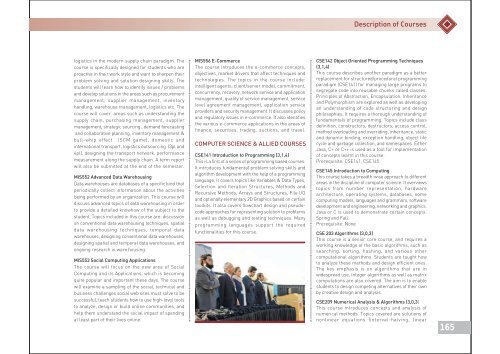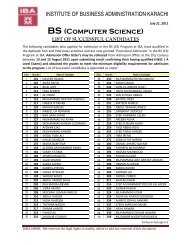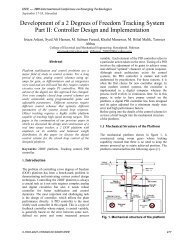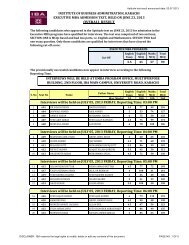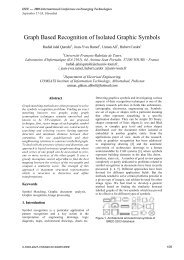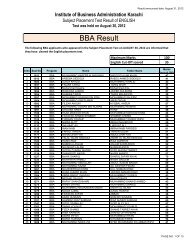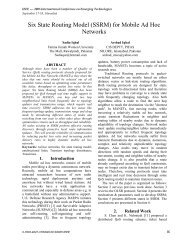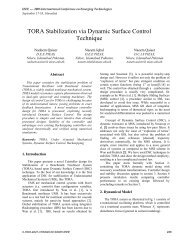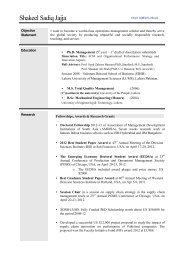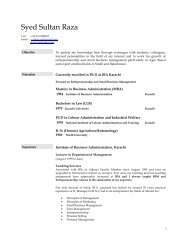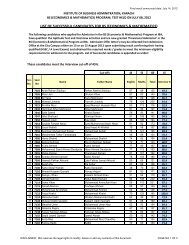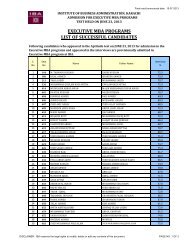Description <strong>of</strong> Courses164management systems, social collaboration, socialnetwork analysis and visualization, tagging, virtualcommunities <strong>of</strong> practice, wiki technology and culture.MIS410 Basic <strong>Program</strong>mingThis course is intending to enable students <strong>of</strong>Accounting and Finance background to develop basicunderstanding <strong>of</strong> backend knowledge for s<strong>of</strong>twaredevelopment. It introduces fundamental problemsolving skills, and algorithm development with the help<strong>of</strong> programming language. It covers topics like Variablesand data types. Selection and iteration structures.Method and recursive methods, Arrays and structures,File I/O and optionally elementary 2D graphics basedon certain toolkits. It also covers flow chart design andpseudo-code approaches for representing solution toproblems as well as debugging and testing techniques.MIS454 Audit, Ethics & IS Issues (3,0,3)The course analyzes the impact <strong>of</strong> computers onsociety. Topics included are privacy issues, changingpatterns <strong>of</strong> interaction, security, control <strong>of</strong> informationsystems, breakdowns, vulnerability, hazards, computercrimes, fraud, defenses, access controls, audit planningand execution, disaster recovery and risk management.Prerequisite: MIS102MIS458 Enterprise Resource Planning (3,0,3)Now a days the corporate world is moving towardsERP Implementations. ERP has become the backbone<strong>of</strong> modern corporate world and it is hard to imagine acorporation without ERP. The ERP course will give thestudents a clear understanding what is ERP and whatis does and what are the issues in the organizationsthat lead toward ERP implementation. The ERP coursewill cover areas such as Fundamental Concepts aboutERP, Major ERP Vendors, ERP Selection Process(including ERP <strong>Business</strong> case development, <strong>Business</strong>Requirement definition, ERP Budgeting, Request forProposal and ERP Vendor demos and ERP selectioncriteria), and Project Management and Informationflows in ERP. The course will also cover the overview<strong>of</strong> SAP modules (Sales and Distribution, MaterialManagement, Production and Supply ChainManagement). The Students are required to dopresentations and conduct surveys about ERP relatedtopics. A term report will also be submitted at the end<strong>of</strong> the Semester.MIS502 Operations & Technology ManagementTechnology is becoming an indispensable tool forcompanies to stay competitive in the fast changingbusiness environment <strong>of</strong> today and there is anincreasing demand for effectively introducing andmanaging technology in the corporate world. Thecourse will cover the management <strong>of</strong> business systemsthat produce goods, as well as those that provideservices. It will discuss key issues in OperationsManagement including Lean Production, Six Sigma,5S, JIT, Kaizen, and Continuous Process Improvementand explore the implementation <strong>of</strong> technology to solveoperational problems. It will provide tools for analyzingbusiness processes for improvement and forincorporating and managing technology to providesustainable competitive advantage to the organization.problems. It will provide tools for analyzing businessprocesses for improvement and for incorporating andmanaging technology to provide sustainable competitiveadvantage to the organization.MIS503 Enterprise IntegrationThis course provides students with the theories, models,and analytic techniques required to develop solutionsfor integrating heterogeneous information systems.Basic concepts that must be applied to enable diverseapplications developed in different environments undera variety <strong>of</strong> rules and standards to process cooperativelywill be explored and illustrated. This course serves asa focused introduction to the concept that informationsystems must be utilized (i.e., re-used) rather thanredeveloped and will give consideration to the role <strong>of</strong>users and the impact <strong>of</strong> information systems on thosepeople. Independent and group assignments willprovide the students with the opportunity to investigateEnterprise Integration solutions from the Web and inuse in local environmentsMIS513 Information Industry Structure & CompetitiveStrategyThis course draws upon the most recent experiencein the impact <strong>of</strong> information technology upon diverseindustries, ranging from securities trading to consumerpacked goods relating. It integrates the experiencewith relevant theory to develop a theory <strong>of</strong> competitivestrategy for electronic commerce, and for informationbasedstrategies more generally. It is not tools andtechniques course or a quantitative analysis course;likewise it is not a technology or an implementationcourse. It provides a focused and modern complementto strategic planning.MIS541 SAP ABAP <strong>Program</strong>ming IThe first section <strong>of</strong> this course comprises <strong>of</strong> Introductionto SAP ABAP, SAP architecture, and ABAP Developmentworkbench tools. The second section deals with study<strong>of</strong> ABAP workbench in detail, which includes, study <strong>of</strong>flow <strong>of</strong> an ABAP program, ABAP workbench, ABAPdictionary, ABAP language elements, data retrieval,subroutines and ABAP events. The third section <strong>of</strong> thiscourse is based on in-depth study <strong>of</strong> ABAP dictionary,including study <strong>of</strong> data objects, performance, inputhecks, object dependencies, views, search andperformance monitoring.MIS542 SAP ABAP <strong>Program</strong>ming IIThis course is divided into three sections. The first partdeals with Object Oriented paradigm in SAP ABAP.Object Oriented <strong>Program</strong>ming techniques, RepositoryObjects, Exception handling and RTTS are covered inthe first part <strong>of</strong> this course. The second part is advancedABAP and covers topics such as ABAP runtime, typesand data objects, internal tables and function groups.The third part deals with developing user dialogs withinABAP. This section covers topics such as screenprogramming, program interface, screen elements,lists and context menus.MIS550 Logistic & Supply Chain Management (3,0,3)Logistics is one <strong>of</strong> the most important aspect <strong>of</strong> supplychain and its importance is growing rapidly as theworld is moving towards globalization. After completingthis course the students will have a clear understandingwhat is supply chain management and the role <strong>of</strong>
Description <strong>of</strong> Courseslogistics in the modern supply chain paradigm. Thecourse is specifically designed for students who areproactive in their work style and want to sharpen theirproblem solving and solution designing skills. Thestudents will learn how to identify issues / problemsand develop solutions in the areas such as procurementmanagement, supplier management, inventoryhandling, warehouse management, logistics etc. Thecourse will cover areas such as understanding thesupply chain, purchasing management, suppliermanagement, strategic sourcing , demand forecastingand collaborative planning, inventory management &bull-whip effect (SCM game), domestic andinternational transport, logistics outsourcing (3pl and4pl), designing the transport network, performancemeasurement along the supply chain. A term reportwill also be submitted at the end <strong>of</strong> the semester.MIS552 Advanced Data WarehousingData warehouses are databases <strong>of</strong> a specific kind thatperiodically collect information about the activitiesbeing performed by an organization. This course willdiscuss advanced topics <strong>of</strong> data warehousing in orderto provide a detailed knowhow <strong>of</strong> the subject to thestudent. Topics included in this course are: discussionon conventional data warehousing techniques, spatialdata warehousing techniques, temporal datawarehouses, designing conventional data warehouses,designing spatial and temporal data warehouses, andongoing research in ware housing.MIS553 Social Computing ApplicationsThe course will focus on the new area <strong>of</strong> SocialComputing and its Applications, which is becomingquite popular and important these days. The coursewill examine a sampling <strong>of</strong> the social, technical andbusiness challenges social web sites must solve to besuccessful, teach students how to use high-level toolsto analyze, design or build online communities, andhelp them understand the social impact <strong>of</strong> spendingat least part <strong>of</strong> their lives online.MIS556 E-CommerceThe course introduces the e-commerce concepts,objectives, market drivers that affect techniques andtechnologies. The topics in the course include:intelligent agents, client/server model, commitment,concurrency, recovery, network service and applicationmanagement, quality <strong>of</strong> service management, servicelevel agreement management, application serviceproviders and security management. It discusses policyand regulatory issues in e-commerce. It also identifiesthe various e-commerce applications in the areas <strong>of</strong>finance, securities, trading, auctions, and travel.COMPUTER SCIENCE & ALLIED COURSESCSE<strong>14</strong>1 Introduction to <strong>Program</strong>ming (3,1,4)This is a first <strong>of</strong> a series <strong>of</strong> programming based courses.It introduces fundamental problem solving skills andalgorithm development with the help <strong>of</strong> a programminglanguage. It covers topics like Variables & Data Types,Selection and Iteration Structures, Methods andRecursive Methods, Arrays and Structures, File I/Oand optionally elementary 2D Graphics based on certaintoolkits. It also covers flowchart design and pseudocodeapproaches for representing solution to problemsas well as debugging and testing techniques. Manyprogramming languages support the requiredfunctionalities for this course.CSE<strong>14</strong>2 Object Oriented <strong>Program</strong>ming Techniques(3,1,4)This course describes another paradigm as a betterreplacement for structured/procedural programmingparadigm (CSE<strong>14</strong>1) for managing large programs tosegregate code into reusable chunks called classes.Principles <strong>of</strong> Abstraction, Encapsulation, Inheritanceand Polymorphism are explored as well as developingan understanding <strong>of</strong> code structuring and designphilosophies. It requires a thorough understanding <strong>of</strong>fundamentals <strong>of</strong> programming. Topics include classdefinition, constructors, destructors, access control,method overloading and overriding, inheritance, staticand dynamic binding, exception handling, object lifecycle and garbage collection, and namespaces. EitherJava, C+ or C++ is used as a tool for implementation<strong>of</strong> concepts learnt in this course.Prerequisite: CSE<strong>14</strong>1, CSE<strong>14</strong>5CSE<strong>14</strong>5 Introduction to ComputingThis course takes a breadth-wise approach to differentareas in the discipline <strong>of</strong> computer science. It overviewstopics from number representation, hardwarearchitecture, operating systems, databases, somecomputing models, languages and grammars, s<strong>of</strong>twaredevelopment and engineering, networking and graphics.Java or C is used to demonstrate certain concepts.Spring and Fall.Prerequisite: NoneCSE 203 Algorithms (3,0,3)This course is a senior core course, and requires aworking knowledge <strong>of</strong> the basic algorithms, such assearching, sorting, hashing, and various othercomputational algorithms. Students are taught howto analyze these methods and design efficient ones.The key emphasis is on algorithms that are inwidespread use. Integer algorithms as well as matrixcomputations are also covered. The aim is to enablestudents to design competing alternatives <strong>of</strong> their ownby creative design and analysis.CSE209 Numerical Analysis & Algorithms (3,0,3)This course introduces concepts and analysis <strong>of</strong>numerical methods. Topics covered are solutions <strong>of</strong>nonlinear equations (interval-halving, linear165


